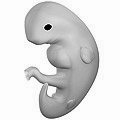Pregnancy
(Redirected from Pregnant women)
Editor-In-Chief: Prab R Tumpati, MD
Obesity, Sleep & Internal medicine
Founder, WikiMD Wellnesspedia &
W8MD medical weight loss NYC and sleep center NYC
| Pregnancy | |
|---|---|

| |
| Synonyms | N/A |
| Pronounce | N/A |
| Specialty | N/A |
| Symptoms | Missed menstrual period, nausea, vomiting, breast tenderness, fatigue |
| Complications | Gestational diabetes, preeclampsia, preterm birth |
| Onset | Conception |
| Duration | Approximately 40 weeks from the last menstrual period |
| Types | Singleton, multiple pregnancy |
| Causes | Fertilization of an ovum by a sperm |
| Risks | Advanced maternal age, obesity, smoking |
| Diagnosis | Pregnancy test, ultrasound |
| Differential diagnosis | N/A |
| Prevention | Contraception |
| Treatment | Prenatal care |
| Medication | N/A |
| Prognosis | N/A |
| Frequency | Common |
| Deaths | Varies by region |
Pregnancy is when a female mammal has an unborn baby inside her. During pregnancy, a female is called "pregnant". A human pregnancy is about 38 weeks long, from conception to childbirth. Usually the mother has one baby at a time. Sometimes the mother has two babies at one time. Two babies are called twins. The mother can have three or more babies at one time. This does not happen very often.
Start[edit | edit source]
Pregnancy usually starts after a woman has sexual intercourse with a man. Her ovum (or egg) and his sperm (seed) come together and form a zygote (fertilized egg) inside her.]]
Some people have trouble becoming pregnant. This is called infertility. Women and men with infertility may take drugs or have surgery to help a pregnancy start. Some people use treatments that are not natural, like in vitro fertilization, to become pregnant with the help of a doctor.
Growth of the baby[edit | edit source]
When the woman's egg and the man's seed come together, it makes one cell called a zygote. The zygote grows into an embryo, which grows into a fetus. When the fetus is ready, the baby is born.
Length[edit | edit source]
Human pregnancy is divided into three parts called trimesters. A trimester is about three months long. During the first trimester, the woman might feel ill in her stomach. She might have to urinate often. During the second trimester, the woman's abdomen starts to stick out. During the third trimester, her abdomen sticks out even more, and she becomes even heavier.
Birth[edit | edit source]
At the end of a full pregnancy, the woman's body pushes the baby out through her vagina. This is called delivering a baby or giving birth. Mothers can get help for birth from a midwife, nurse, or doctor. In some places, mothers give birth at home. In other places, mothers give birth in a hospital. Mothers who are ill or hurt may need to go to a hospital. Giving birth can hurt a lot at the end. In hospitals, a doctor or midwife can give drugs to the mother to reduce the pain. If the baby cannot be pushed out, then a doctor can cut the mother open to take the baby out. This operation is called a Caesarean section.
Social problems[edit | edit source]
The Convention on the Elimination of All Forms of Discrimination against Women says that pregnant women must be given time away from work or equal welfare for her baby without losing her job (Article 11).
Pregnancy problems[edit | edit source]
Sometimes there are problems with pregnancies. A miscarriage (spontaneous abortion) is when the baby dies before it is born. A stillbirth is when the baby is dead when it is born. There are also diseases caused by pregnancy. Sometimes, women die from giving birth. In developed countries, this is much less common than it used to be. Every year, about 500,000 women die from giving birth, while about 7,000,000 mothers have big problems from giving birth. For example, giving birth can tear the mother's body and cause an obstetric fistula.
Abortion[edit | edit source]
A pregnancy can also stop without the baby being born. This is called abortion. Doctors can do things that will stop a pregnancy. Such an abortion is called induced abortion. Countries have different laws about induced abortions. Some countries allow it, and others do not. In some countries, it is allowed, but only for certain reasons, such as the pregnancy resulting from rape, or a doctor saying that the pregnant woman might die if the pregnancy is not stopped. People also have different opinions about abortion. Often, these are influenced by religious beliefs. There are a few diseases that can kill a woman or make her very ill if she has a baby. Having abortions could save the lives or health of these mothers.
Pregnancy test[edit | edit source]
A pregnancy test is something that women use to tell whether they are pregnant. The woman urinates on the stick. If the woman is pregnant, a plus sign or two lines will appear on the stick. If the woman is not pregnant, then a minus sign or one line will appear on the stick.
Pregnancy gallery[edit | edit source]
| Pregnancy and childbirth | ||||||||||
|---|---|---|---|---|---|---|---|---|---|---|
|
| Pathology of pregnancy, childbirth, and the puerperium | ||||||||||||
|---|---|---|---|---|---|---|---|---|---|---|---|---|
* ' Category'
|
| Conditions originating in the perinatal period / fetal disease | ||||||||||
|---|---|---|---|---|---|---|---|---|---|---|
|
| Sexual and reproductive health | ||||||||||
|---|---|---|---|---|---|---|---|---|---|---|
|
| Human physiology of sexual reproduction | ||||||||||
|---|---|---|---|---|---|---|---|---|---|---|
|
| Development of the human body | ||||||||
|---|---|---|---|---|---|---|---|---|
|
| Outline of human sexuality | ||||||||||
|---|---|---|---|---|---|---|---|---|---|---|
*
|
Search WikiMD
Ad.Tired of being Overweight? Try W8MD's physician weight loss program.
Semaglutide (Ozempic / Wegovy and Tirzepatide (Mounjaro / Zepbound) available.
Advertise on WikiMD
|
WikiMD's Wellness Encyclopedia |
| Let Food Be Thy Medicine Medicine Thy Food - Hippocrates |
Translate this page: - East Asian
中文,
日本,
한국어,
South Asian
हिन्दी,
தமிழ்,
తెలుగు,
Urdu,
ಕನ್ನಡ,
Southeast Asian
Indonesian,
Vietnamese,
Thai,
မြန်မာဘာသာ,
বাংলা
European
español,
Deutsch,
français,
Greek,
português do Brasil,
polski,
română,
русский,
Nederlands,
norsk,
svenska,
suomi,
Italian
Middle Eastern & African
عربى,
Turkish,
Persian,
Hebrew,
Afrikaans,
isiZulu,
Kiswahili,
Other
Bulgarian,
Hungarian,
Czech,
Swedish,
മലയാളം,
मराठी,
ਪੰਜਾਬੀ,
ગુજરાતી,
Portuguese,
Ukrainian
Medical Disclaimer: WikiMD is not a substitute for professional medical advice. The information on WikiMD is provided as an information resource only, may be incorrect, outdated or misleading, and is not to be used or relied on for any diagnostic or treatment purposes. Please consult your health care provider before making any healthcare decisions or for guidance about a specific medical condition. WikiMD expressly disclaims responsibility, and shall have no liability, for any damages, loss, injury, or liability whatsoever suffered as a result of your reliance on the information contained in this site. By visiting this site you agree to the foregoing terms and conditions, which may from time to time be changed or supplemented by WikiMD. If you do not agree to the foregoing terms and conditions, you should not enter or use this site. See full disclaimer.
Credits:Most images are courtesy of Wikimedia commons, and templates, categories Wikipedia, licensed under CC BY SA or similar.
Contributors: Prab R. Tumpati, MD

















